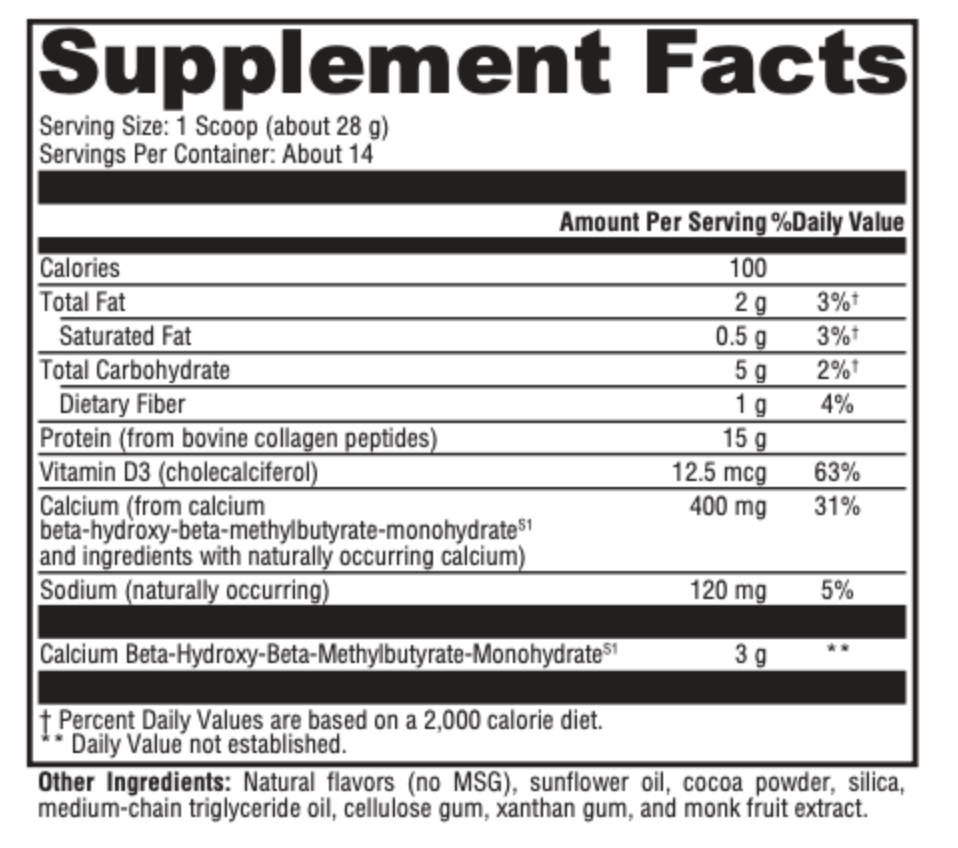Look, Feel & Be Your Best
Start your wellness journey
Book NowSero-Lean Collagen features bovine collagen peptides complemented with beta-hydroxy-beta-methylbutyrate (HMB) and vitamin D3, making it an optimal choice for supporting collagen production, the integrity of connective tissues, and muscle health. A natural metabolite of leucine, HMB increases lean muscle mass through dual mechanisms: inhibiting protein degradation and promoting protein synthesis. This versatile formula rapidly disperses in water and is ideal for athletes or for individuals who need an easily digested protein source.*
All Serotonin Nutraceuticals LLC. Formulas Meet or Exceed cGMP Quality Standards
Collagen is a primary structural component of connective tissue that accounts for as much as 30% of the body’s total protein. It is found in skin, ligaments, tendons, cartilage, tooth dentin, bone, and muscle, and it is also part of the structure of arteries and veins. Collagen protein has a unique amino acid composition with an unusually high content of glycine and proline along with the modified amino acid hydroxyproline, making it ideal for supporting the turnover and renewal of structural proteins.
Due to the well-established function of collagen’s contribution to the integrity of articular cartilage, supplemental collagen peptides have been studied for their potential benefit to cartilage health. The results of a randomized, double-blind, placebo-controlled study of subjects (N = 30) with osteoarthritis (OA) who were given placebo or 5 g of collagen peptide twice daily for 13 weeks demonstrated that collagen peptides were effective in improving OA symptoms. The researchers hypothesized that the mechanism for this effect is attributed to the role that collagen peptides play in regulating chondrocyte differentiation and stimulating proteoglycan synthesis, resulting in cartilage tissue support.
Several studies have explored the effects of collagen peptide supplementation on body composition, strength, and muscle health when combined with resistance exercise. In a randomized, double-blind, placebo-controlled study of recreationally active male subjects (N = 57), the test group was supplemented with 15 g of collagen peptides while engaging in a resistance training program. Both groups showed a slight increase in strength, but an increase in fat-free mass was observed in the supplemented group, suggesting an increased effectiveness when combined with physical activity. Muscle fiber biopsies in subjects did not differ between the test or placebo group, leading the researchers to attribute the increase of fat-free mass in the supplemented group with hypertrophy of contractile muscle cells and possibly a higher increase in connective tissue.
Many of the studies assessing the effect of collagen protein supplementation combined with resistance training have been conducted with male subjects. However, a 12-week randomized, controlled trial in pre-menopausal subjects (N = 77) showed an increase in muscle strength and fat-free mass in women who combined 15 g of collagen peptide supplementation with resistance exercise three-times per week.
HMB
Beta-hydroxy-beta-methylbutyrate (HMB) is a metabolite of the essential amino acid leucine found naturally within human muscle cells, and it has been reported to have anabolic effects on protein muscle metabolism. Several mechanisms of action have been proposed to explain the action of HMB on muscle health. Among them are that HMB attenuates training-induced proteolysis via downregulation of proteolytic pathways, and it acts as a signaling molecule for stimulation of protein synthesis. Studies conducted mostly in athletes have suggested that HMB supplementation may exert beneficial effects on muscle mass and function, most notably when combined with resistance-type exercise training.
In a randomized, double-blind, placebo-controlled, parallel design study, subjects (N = 31) aged 70 and older were given 3 g of HMB or placebo daily for eight weeks with a prescribed exercise program for five days per week. In the supplemented group, subjects showed an increase in lean body mass similar to that seen in young participants, which reported a decrease in muscle proteolysis and an increase in fat-free mass in young adults with resistance training. These findings suggested that the results are indicative of the role HMB plays for decreasing proteolysis.
Results from a randomized study in young, healthy, sedentary subjects (N = 37) given 3 g of supplemental HMB daily for three weeks showed an increase in fat-free mass and total body strength suggesting that HMB partially attenuates muscle protein breakdown without exercise. To further illustrate the benefit of HMB supplementation on muscle health without any form of exercise, a randomized, double-blind, placebo-controlled, parallel design study was conducted with healthy subjects (N = 24) aged 60-76 years who were confined to complete bed rest. Subjects in the test group were given 3 g of HMB five days prior to bed rest and up to the end of the 10-day rehabilitation phase, resulting in the preservation of muscle mass when compared to the placebo group. Results suggested that HMB helped to preserve muscle mass in the immobilization period.

Mix one level scoop (28 g) with 6-8 oz of cold water and consume daily, or use as directed by your healthcare professional. Adjust the amount of water according to thickness desired. Consult your healthcare professional before use. Individuals taking medication should discuss potential interactions with their healthcare professional. Do not use if tamper seal is damaged.
Wheat, gluten, yeast, soy protein, dairy products, fish, shellfish, peanuts, tree nuts, egg, artificial colors, artificial sweeteners, and artificial preservatives.
S1. myHMB® is a registered trademark of Metabolic Technologies, LLC. Nutritional uses of calcium beta-hydroxy-beta-methylbutyrate-monohydrate and vitamin D are licensed to Metabolic Technologies, LLC, under U.S. patents 8,815,280, 9,259,430, and 9,539,224.
Several systematic reviews and meta-analyses have helped to solidify the body of evidence supporting the effectiveness of HMB on strength, body composition, and muscle health in trained and untrained individuals. A meta-analysis of randomized, placebo-controlled trials with supplemental HMB in doses ranging from 1.5 to 6 g/day for a three- to nine-week period indicated sufficient data to support strength gains in untrained participants and a negligible effect in trained individuals but with an incremental effect on body composition. A meta-analysis exploring the potential benefit of supplements on lean mass and strength with resistance training reviewed over 250 different supplemental ingredients and noted that only six had adequate research for inclusion. Nine HMB studies qualified with analysis demonstrating that a 3 g/day dose provided support for net gain in strength and lean mass gains. The results of a systematic review and meta-analysis assessing the outcome of HMB supplementation in a clinical setting of subjects (N = 2,137) with conditions characterized by loss in skeletal muscle mass and weakness were in line with previous reviews of older adults and athletes, suggesting that the effect of HMB increases skeletal muscle mass and improves muscle strength.
Vitamin D
Vitamin D has a well-known function in bone health due to its role in the regulation of calcium and phosphate homeostasis. It has also been linked to skeletal muscle health and function. Low serum levels of vitamin D are correlated with muscle weakness and myopathy. In vitro studies have shown that vitamin D is necessary for the mitochondrial function of providing energy to skeletal muscle cells.
A cross-sectional study examining the relationship between vitamin D status and strength in collegiate athletes (N = 103) showed that a decrease in serum D was correlated with a decrease in indicators of muscle strength and anaerobic power. The authors concluded that vitamin D should be considered as a component of training to maximize performance in sports requiring muscular strength.
A systematic review and meta-analysis of 17 randomized-controlled trials assessing vitamin D supplementation and its role in muscle strength suggested that in individuals with baseline vitamin D levels the outcome of supplementation was not significant, but an increase in strength was shown in those who were deficient. Another study reviewed the role of vitamin D in muscle function with data from 30 randomized trials involving over 5,600 participants indicating that supplementation has a positive impact on muscle strength. The authors suggested that additional research is needed to define optimal dose, duration, and mode of administration.
There have also been studies on the combined effect of vitamin D with HMB. In a randomized, double-blind, placebo-controlled, 12-month trial in older subjects (N = 117), HMB (3 g) and vitamin D (2,000 IU) were shown to be of benefit to muscular function with or without the use of training. Another study looked at previous data of vitamin D status in older adults who used HMB supplements. It was found that muscle mass increased regardless of vitamin D status, but strength increases were observed only in individuals with adequate vitamin D status, demonstrating a synergistic effect of HMB and vitamin D on muscle function.
These statements have not been evaluated by the Food and Drug Administration. This product is not intended to diagnose, treat, cure, or prevent any disease.
